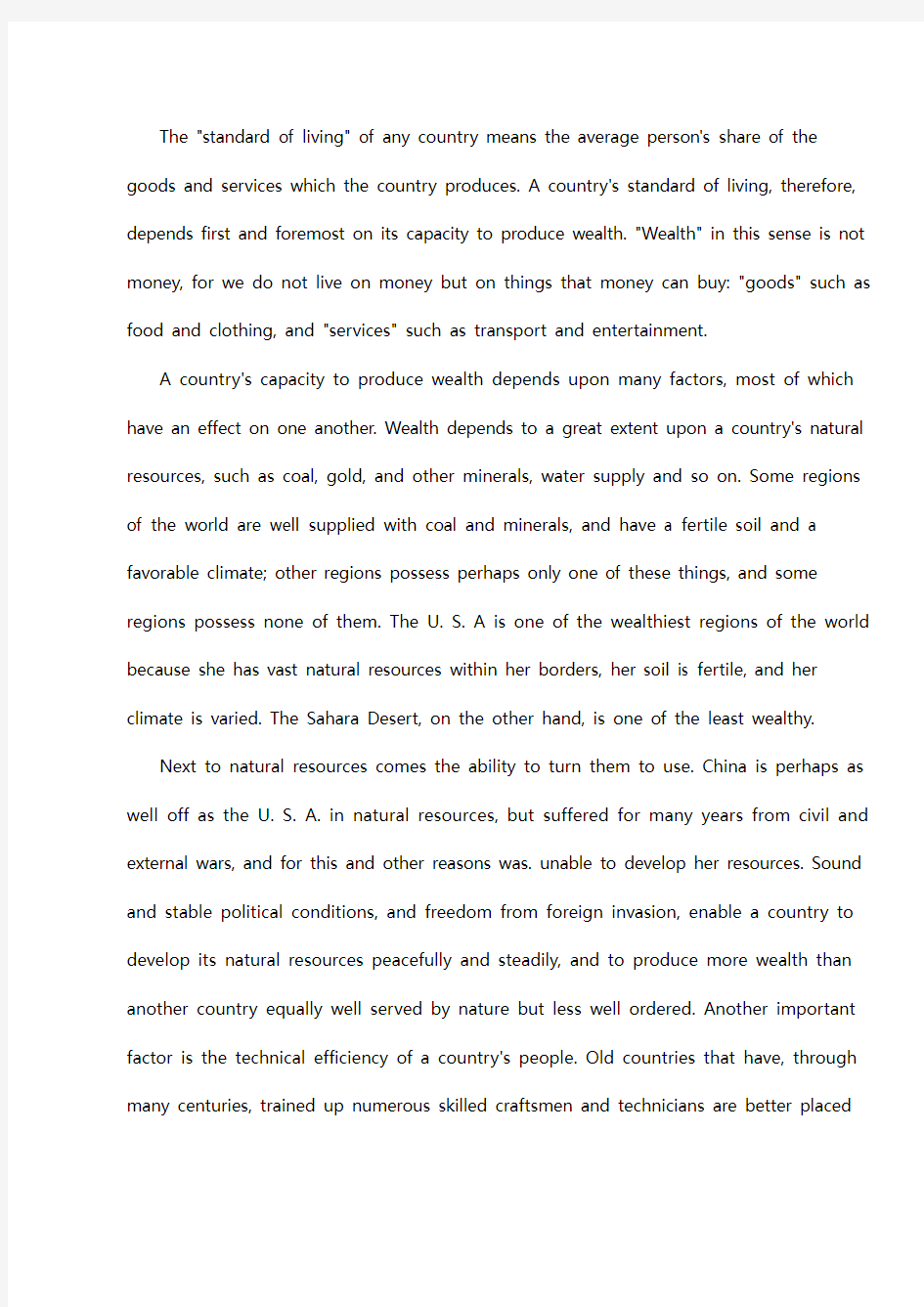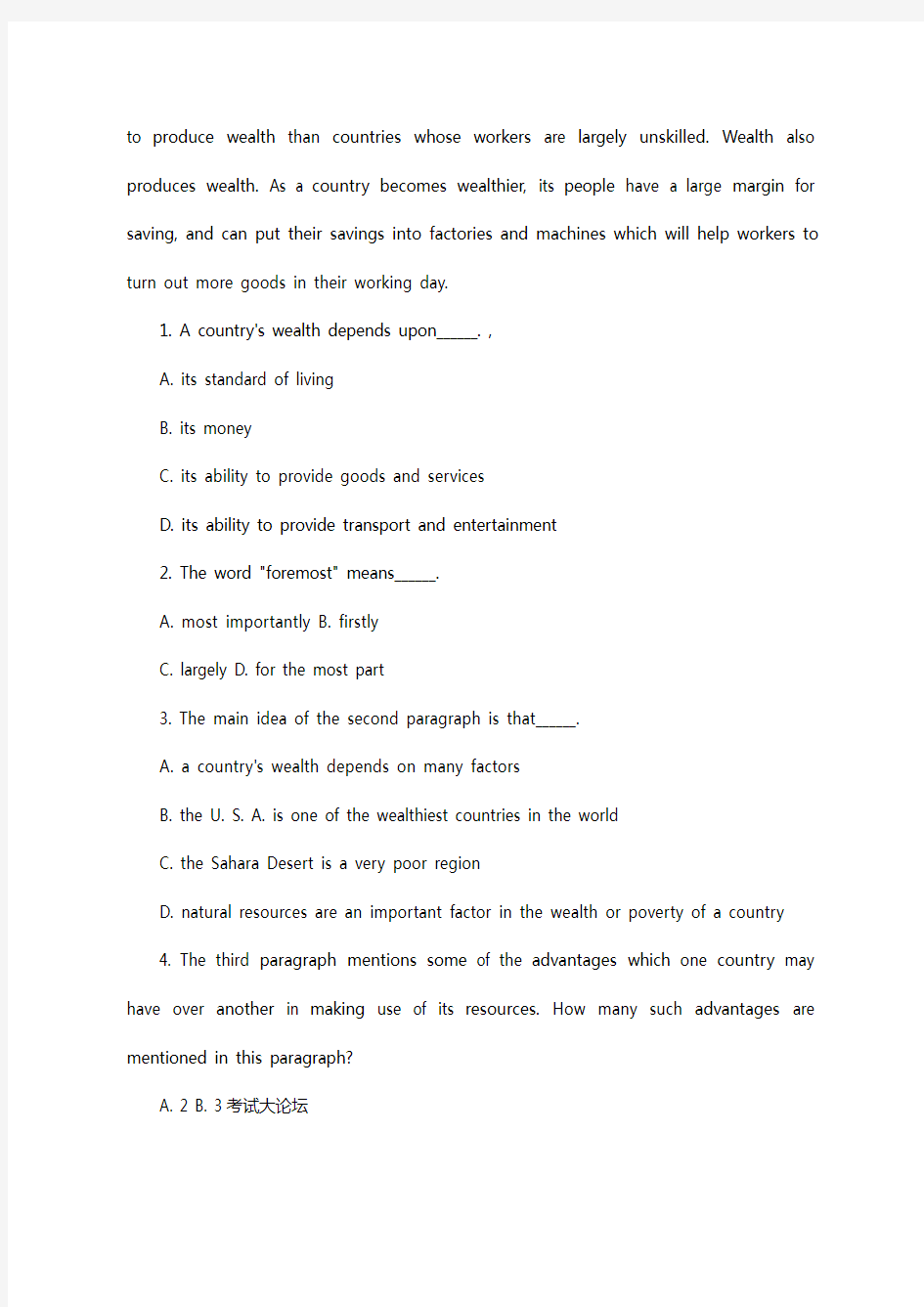

The "standard of living" of any country means the average person's share of the goods and services which the country produces. A country's standard of living, therefore, depends first and foremost on its capacity to produce wealth. "Wealth" in this sense is not money, for we do not live on money but on things that money can buy: "goods" such as food and clothing, and "services" such as transport and entertainment.
A country's capacity to produce wealth depends upon many factors, most of which have an effect on one another. Wealth depends to a great extent upon a country's natural resources, such as coal, gold, and other minerals, water supply and so on. Some regions of the world are well supplied with coal and minerals, and have a fertile soil and a favorable climate; other regions possess perhaps only one of these things, and some regions possess none of them. The U. S. A is one of the wealthiest regions of the world because she has vast natural resources within her borders, her soil is fertile, and her climate is varied. The Sahara Desert, on the other hand, is one of the least wealthy.
Next to natural resources comes the ability to turn them to use. China is perhaps as well off as the U. S. A. in natural resources, but suffered for many years from civil and external wars, and for this and other reasons was. unable to develop her resources. Sound and stable political conditions, and freedom from foreign invasion, enable a country to develop its natural resources peacefully and steadily, and to produce more wealth than another country equally well served by nature but less well ordered. Another important factor is the technical efficiency of a country's people. Old countries that have, through many centuries, trained up numerous skilled craftsmen and technicians are better placed
to produce wealth than countries whose workers are largely unskilled. Wealth also produces wealth. As a country becomes wealthier, its people have a large margin for saving, and can put their savings into factories and machines which will help workers to turn out more goods in their working day.
1. A country's wealth depends upon______. ,
A. its standard of living
B. its money
C. its ability to provide goods and services
D. its ability to provide transport and entertainment
2. The word "foremost" means______.
A. most importantly
B. firstly
C. largely
D. for the most part
3. The main idea of the second paragraph is that______.
A. a country's wealth depends on many factors
B. the U. S. A. is one of the wealthiest countries in the world
C. the Sahara Desert is a very poor region
D. natural resources are an important factor in the wealth or poverty of a country
4. The third paragraph mentions some of the advantages which one country may have over another in making use of its resources. How many such advantages are mentioned in this paragraph?
A. 2
B. 3考试大论坛
C. 4
D. 5
5. The second sentence.in Paragraph 3 is______.
A. the main idea of the paragraph
B. an example supporting the main idea of the paragraph
C. the conclusion of the paragraph
D. not related to the paragraph
1. C
2. A
3. A
4. B
5. B
Sugar is so much a part of our modern life that we only really think about it when, for some ___1___ , we cannot obtain it. It has been known to man for at least 3,000 years, but has ___2___ into common use only in ___3___times. Until quite recently it was considered as a medicine and as a luxury for the very rich only.
Sugar is, then, ___4 ___to our civilization. But what___5___ is it? Of course, most of us recognize sugar immediately as the sweet material which we put in coffee or cakes. This common form of sugar is derived from two plants: the sugar cane (a type of grass which grows to a height of twenty feet) and the sugar beet (which grows under ground). But there are in fact many types of sugar, and the chemist recognizes hundreds of different ___6___ , each coming from a different source.
About 90% of the sugar is produced as food. Only 10% is used in industry for ___7___other than food production. Yet sugar has great possibilities for use as the basis of chemicals. It can even be used for making plastics. In the future these potential uses will certainly be developed more than in the past.来源:考试大的美女编辑们
There are many reasons why we should ___8___the production of sugar. Most important is that it is one of the most highly concentrated of energy foods.
Thus sugar cane and beet produce an average of 7,000,000 calories per acre. In this way they have the advantage over potatoes which give only 4, 000, 000, while the___9___ for wheat and beans is 2 ,000,000 each. So three acres of land growing wheat, beans and potatoes give only ___10__more energy than one acre of sugar.
A. slightly
B. intention
C. reason
D. modern
E. strongly
F. figure
G. come
H. significant
I. exactly J. increase K. proposals L. turn
M. purposes N. varieties O. serious
I. C 2. G 3. D 4. H 5. I 6. N 7. M 8. J 9. F 10. A
Pronouncing a language is a skill. Every normal person is expert in the skill of pronouncing his own language; but few people are even moderately proficient at pronouncing foreign languages. Now there are many reasons for this, some obvious, some perhaps not so obvious. But I suggest that the fundamental reason why people in general do not speak foreign languages very much better than they do is that they fail to grasp the true nature of the problem of learning to pronounce, and consequently never set about tackling it in the right way. Far too many people fail to realize that pronouncing a foreign language is a skill—one that needs careful training of a special kind, and one that cannot be acquired by just leaving it to take care of itself. I think even teachers of language, while recognizing the importance of a good accent, tend to neglect, in their
practical teaching, the branch of study concerned with speaking the language. So the first point I want to make is that English pronunciation must be taught; the teacher should be prepared to devote some of the lesson time to this, and should get the student to feel that here is a matter worthy of receiving his close attention. So, there should be occasions when other aspects of English, such as grammar or spelling, are allowed for the moment to take second place.
Apart from this question of the time given to pronunciation, there are two other requirements for the teacher: the first, knowledge; the second, technique.
It is important that the teacher should be in possession of the necessary information. This can generally be obtained from books. It is possible to get from books some idea of the mechanics of speech, and of what we call general phonetic theory. It is also possible in this way to get a clear mental picture of the relationship between the sounds of different languages, between the speech habits of English people and those, say, of your students. Unless the teacher has such a picture, any comments he may make on his students' pronunciation are unlikely to be of much use, and lesson time spent on pronunciation may well be time wasted.
26. What does the writer actually say about pronouncing foreign languages?
A. Only a few people are really proficient.
B. No one is really an expert in the skill.
C. There aren't many people who are even fairly good.
D. There are even some people who are moderately proficient.